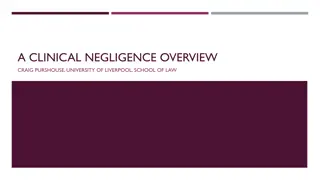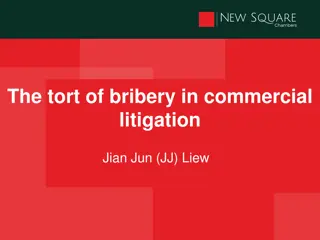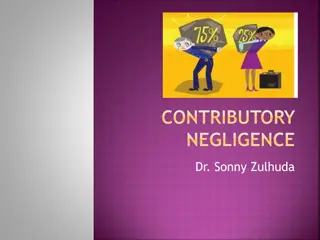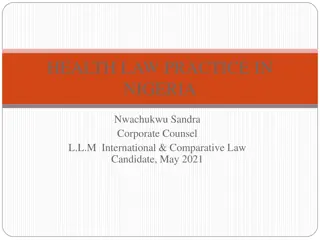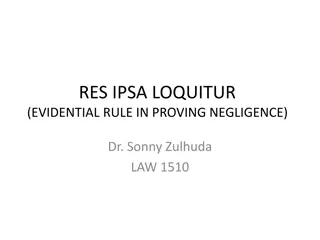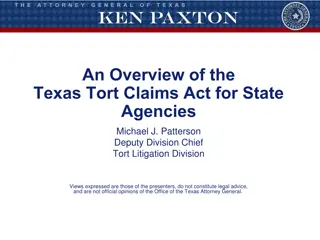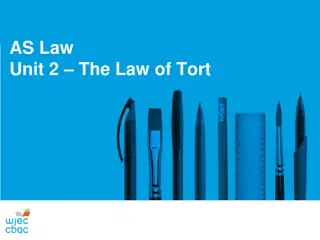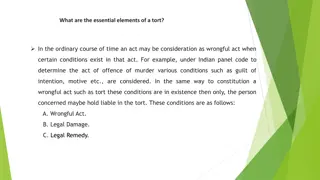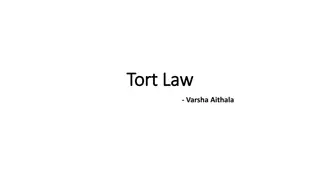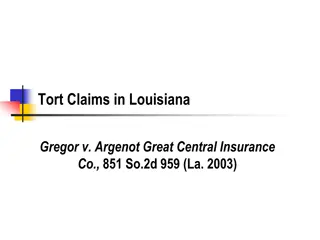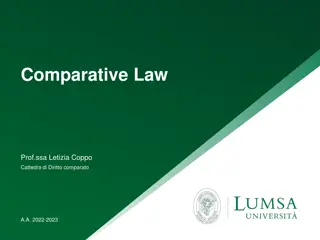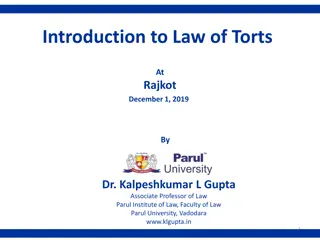Understanding Negligence in Tort Law
Negligence in tort law refers to carelessness in legal terms, indicating a failure to meet the basic duty of care that a reasonable person would provide in various situations. It involves breaching a legal duty to take care, resulting in harm to the plaintiff. Key elements include duty to take care, duty towards the plaintiff, duty to whom, and breach of duty. Case examples like Grant v. Australian Knitting Mills Ltd. and Donoghue v. Stevenson illustrate the importance of these essentials in negligence cases.
Download Presentation

Please find below an Image/Link to download the presentation.
The content on the website is provided AS IS for your information and personal use only. It may not be sold, licensed, or shared on other websites without obtaining consent from the author. Download presentation by click this link. If you encounter any issues during the download, it is possible that the publisher has removed the file from their server.
E N D
Presentation Transcript
Negligence Tort Law In day to day life, the word negligence means nothing else but carelessness. Under the legal sense, it highlights the failure to perform the basic of care which the performer as a reasonable man should perform have in all the situations. In general, there is a legal duty to consider when it can be foreseen that failure to do so can cause harm.
Definition of Negligence According to Winfield and Jolowicz Negligence is the breach of a legal duty to take care which results in damage, undesired by the defendant to the plaintiff. Lord Wright states that Negligence means more than headless or careless conduct, whether in commission or omission; it properly connotes the complex concept of duty, breach, and damage thereby suffered by the person to whom the duty was owed.
Essentials of Negligence Tort 1. Duty to Take Care There is an important condition under the liability for negligence that the defendant owes a legal duty towards the plaintiff. The following case laws will help us to understand the important element. In Grant v. Australian Knitting Mills Ltd., 1935 AC 85; From a retailer, the plaintiff purchases two sets of woolen underwear. After wearing it, he suffers from a skin disease. This problem occurs due to the excess amount of sulphates present in the wool and not removing it at the time of washing it due to the negligence at the time of washing it. In this case, the manufacturers are completely liable as they are not able to perform their duty correctly.
2. Duty to whom Donoghue v. Stevenson, 1932 AC 562, adds further to this idea and expands the scope of duty by stating that the duty so raises extends to our neighbor. While explaining who is my neighbor LORD ATKIN states that the answer must be the persons who are so closely and directly affected by my act that I ought reasonably to have them in contemplation as being so affected when I am directing my mind to the acts or omissions which are called in question . 3. Duty must be towards the plaintiff It is not ample that the defendant owes a duty to take care of. A duty should be there, according to which, the defendant should owe a duty of care towards the plaintiff.
4. Breach of Duty to take care One very important condition for the liability in negligence is that the plaintiff must prove that due to the negligence the defendant is not able to perform his duties. In Municipal Corporation of Delhi v. Subhagwanti, AIR 1966 SC 1750; a number of persons died due the collapsing of a clock-tower in the heart of the Chandni Chowk, Delhi. The normal life of such structures are normally 40 45 years but the tower was around 80 years old. The Municipal Corporation of Delhi is held liable as it is under their hands and they are not able to take care and perform their duties efficiently.




